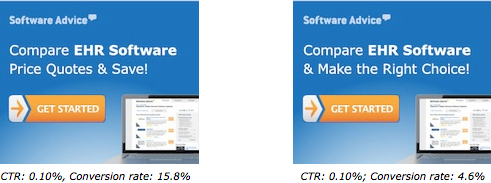Today we have a guest blogger, Derek Singleton from Software Advice, providing some tips on How To Improve Your Retargeting Campaign:
Over the last two years at Software Advice, we’ve experimented extensively with site retargeting--a display advertising method that shows your ads to visitors who previously visited your website, but are now visiting other sites. When we first got into retargeting, we were familiar with pay per click and had gotten quite efficient at setting up campaigns with decent margins.
When we got into retargeting, however, we had to learn a lot of new tricks familiarize ourselves with unique aspects of running a retargeting campaign. I’d like to share four lessons that we learned through trial and error over our two years of experimentation.
1. Check Your Campaign Settings
While it’s a logical step to focus on your campaign settings, there are several defaults that most retargeting vendors use in their system which can lead you to incorrectly target visitors. Here are a few tips on dialing in campaign settings.
Audience geography. Most vendors will default to displaying your ads internationally. If you don’t operate internationally, you’ll want to set some country-specific parameters.
Cookie duration. It’s important to align your buying cycle with the cookie duration for each user. Most vendors will set your cookie duration somewhere between 30-90 days. If you have a buying cycle of 5 days, this will cause you to pay for ads that are longer effective.
Offer rotation. You should also tune your settings to rotate which ad you show a particular user over the course of the cookie duration. While they may not have clicked on your whitepaper download, they may be interested in getting a free price quote.
2. Divide Your Site into Areas of Interest
Of course, if you want to truly get targeted with your display ads, you’ll want to show different visitors unique ads based on the pages they viewed on your site.
To segment your audience, you first need to divide your website into areas of interest. One logical segmentation would be to organize your website by industry (vertical market). Another might be to segment based on the products you offer. In either case, you’ll build a profile of your visitors by tracking which URLs they visited (e.g. www.acme.com/industries/financial-services).
This will allow you to show a different ad to someone that works for a small construction firm than you would to a large financial services provider.
3. Test Your Ads in a Disciplined Way
Once you’ve developed audience segmentation framework, it’s time to start tweaking and testing your ads. There are many aspects of an ad that you can change, but a few of them are:
• Ad headline
• Ad copy
• Background color
• Images
• Ad Size
• Calls to action
Most of our focus has been on adjusting the ad copy, ad headline and image in our ads. Below, you can see how dramatic of an impact making small adjustments to your ads can have on your click through rate (CTR) and conversion rates.

In order to know which ads are working, however, it’s important to allow your ads to run long enough to achieve statistical significance. To do this, test the ad in your most active market and get at least 500-1000 clicks before you decided to pull and analyze your data. As you’re conducting these tests, be sure to also utilize your ad rotation as you don’t want to oversaturate visitors.
4. Understand that Attribution Can be Difficult
While you’re testing, you need to keep in mind that attribution can be difficult with site retargeting. For instance, how do you attribute a conversion from a visitor who originally found your website via a PPC campaign, bounced, and then later converted from a retargeting ad?
We give 100 percent attribution to our retargeting campaign if the conversion resulted from a click on our retargeting pixel. You will have to set your own rules for how you attribute campaign effectiveness, but we’ve found that this is the simplest way to get around the issue.
There you have our best tips that we’ve come up with after two years of working with site retargeting. What tips can you share? Leave a comment below to help other Webmasters and Internet advertisers.
Comments